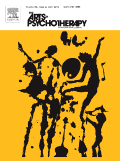
ARTS IN PSYCHOTHERAPY
Scope & Guideline
Innovating Mental Health Solutions with the Arts
Introduction
Aims and Scopes
- Multimodal Arts Therapies:
The journal covers a wide range of arts therapies, including but not limited to art therapy, music therapy, dance/movement therapy, drama therapy, and poetry therapy, emphasizing their applications in clinical settings. - Research on Therapeutic Outcomes:
A significant focus is placed on empirical research that evaluates the effectiveness of arts therapies in treating various psychological issues, such as trauma, anxiety, depression, and developmental disorders. - Innovative Methodologies:
The journal showcases diverse research methodologies, including qualitative, quantitative, mixed methods, and case studies, reflecting the complexity and multifaceted nature of arts therapies. - Cultural and Contextual Sensitivity:
There is a consistent emphasis on understanding the cultural implications of arts therapies, as well as their applications in different socio-economic and geographical contexts. - Interdisciplinary Approaches:
The journal encourages interdisciplinary collaboration, integrating insights from psychology, art, education, and social work to enhance therapeutic practices.
Trending and Emerging
- Trauma-Informed Care:
There is an increasing emphasis on trauma-informed approaches within arts therapies, focusing on how these modalities can specifically address trauma and its effects across various populations. - Digital and Virtual Interventions:
The rise of digital platforms and virtual art-making has become a significant theme, particularly in response to the COVID-19 pandemic, which has driven innovations in therapy delivery. - Cultural Competence and Diversity:
Emerging research is increasingly focusing on culturally responsive practices within arts therapies, reflecting a commitment to inclusivity and understanding of diverse client backgrounds. - Integration with Technology:
The use of technology in arts therapies—such as virtual reality and mobile applications—has gained attention, allowing for new creative avenues and therapeutic possibilities. - Community-Based Arts Interventions:
Research is trending towards community-based approaches that utilize arts therapies to address social issues, enhance community resilience, and foster collective healing.
Declining or Waning
- Traditional Art Therapy Techniques:
There has been a noticeable decline in the focus on traditional art therapy techniques alone, as the field increasingly embraces integrative and multimodal approaches that combine various art forms and therapeutic methods. - Generalized Studies on Art Therapy:
Studies that broadly discuss the application of art therapy without specific context or focus have decreased, indicating a shift towards more targeted and nuanced research questions. - Focus on Adult Populations:
Research centered on adult populations, particularly in non-clinical settings, appears to be waning in favor of studies that address children, adolescents, and marginalized groups, reflecting a broader societal emphasis on youth and vulnerable populations. - Single-Discipline Studies:
There is a decline in studies that focus solely on one type of therapy (e.g., music therapy or dance therapy), as the trend moves towards interdisciplinary research that combines multiple modalities for holistic treatment. - Historical Perspectives:
Less emphasis is being placed on historical analyses of arts therapies, as contemporary research appears to prioritize current applications and innovations over retrospective evaluations.
Similar Journals

Psychoterapia
Advancing the Frontiers of Mental Health ResearchPsychoterapia, published by the Polish Psychiatric Association, is an esteemed academic journal dedicated to the fields of clinical psychology and psychiatry. Established in 2001 and continuing its publication until 2023, this journal serves as a significant platform for the dissemination of research, clinical practices, and theoretical advancements in the realm of mental health. Although it currently holds a Q4 ranking in both the Clinical Psychology and Psychiatry and Mental Health categories, it is committed to improving the understanding and treatment of psychological disorders through rigorous peer-reviewed articles. With its ISSN 0239-4170 and E-ISSN 2391-5862, Psychoterapia provides vital insights that are of interest to researchers, clinicians, and students alike. While the journal does not offer open access options, it remains a recommended resource to further stimulate research and dialogue in the field of psychotherapy.

Body Movement and Dance in Psychotherapy
Advancing Psychotherapy with the Art of MovementBody Movement and Dance in Psychotherapy is an esteemed journal published by Routledge Journals, Taylor & Francis Ltd, focused on the intersection of movement, dance, and psychotherapy. Since its inception in 2006, the journal has provided a platform for the dissemination of innovative research and practical applications related to body movement as a therapeutic tool. It is indexed with the ISSN 1743-2979 and E-ISSN 1743-2987, although it currently does not offer open access. With a reputable presence in the United Kingdom, the journal serves as a valuable resource for professionals and researchers in the fields of clinical psychology and psychiatry, holding a Q4 quartile ranking in both disciplines in 2023. The journal’s unique perspective encourages interdisciplinary collaboration, thereby enriching the therapeutic landscape and fostering a deeper understanding of the role of somatic practices in mental health treatment. Aspiring professionals, dedicated researchers, and students alike will find this journal to be an essential addition to their resources, enhancing both their knowledge and practice.

JOURNAL OF PSYCHOTHERAPY INTEGRATION
Bridging Theory and Practice in PsychotherapyJOURNAL OF PSYCHOTHERAPY INTEGRATION, an esteemed publication of the Educational Publishing Foundation—American Psychological Association, serves as a vital resource for researchers and practitioners in the fields of clinical psychology and psychiatry. With an ISSN of 1053-0479 and an E-ISSN of 1573-3696, this journal has become a cornerstone in advancing knowledge on the integration of psychotherapeutic techniques, offering insights into the evolving practices from 1996 to 2024. The journal holds a respectable status in academic circles, categorized in the Q2 quartile for both Clinical Psychology and Psychiatry and Mental Health, and achieving impressive Scopus rankings that position it within the top percentiles of its fields. Despite the absence of Open Access, readers can benefit from its comprehensive articles that blend theoretical frameworks with empirical research, aimed at enhancing therapeutic outcomes. As an important forum for scholarly dialogue, the JOURNAL OF PSYCHOTHERAPY INTEGRATION underscores the significance of integrative approaches in mental health treatment, making it an essential read for professionals, researchers, and students committed to the advancement of psychotherapy practices.
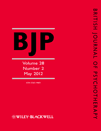
British Journal of Psychotherapy
Exploring New Horizons in Mental Health.The British Journal of Psychotherapy is a prestigious journal published by Wiley, focusing on the intricate fields of Clinical Psychology and Psychiatry and Mental Health. Established in 1984, the journal has provided invaluable contributions to the understanding and progression of psychotherapeutic practices, making it a significant resource for researchers, practitioners, and students alike. With an ISSN of 0265-9883 and an E-ISSN of 1752-0118, the journal features a robust selection of articles, reviews, and empirical studies that underscore the latest developments in psychotherapy. Despite its current categorization in the Q3 quartile in both Clinical Psychology and Psychiatry and Mental Health as of 2023, the journal continually strives to enhance its impact and reach within the academic community, reflecting a commitment to advancing knowledge and fostering dialogue in mental health care. For those seeking a comprehensive understanding of contemporary psychotherapeutic methods and research, this journal remains an essential read.

Journal of Poetry Therapy
Innovating Mental Health Solutions through Expressive ArtsJournal of Poetry Therapy, published by Taylor & Francis Inc., is a vital academic platform dedicated to the exploration of the therapeutic benefits of poetry and expressive arts within the context of clinical psychology and rehabilitation. Established in the United Kingdom, this esteemed journal provides a rigorous forum for interdisciplinary research and practice, bridging the gap between the arts and mental health disciplines. With a notable Q3 ranking in both Clinical Psychology and Rehabilitation categories as of 2023, it is positioned to influence both academic and practical approaches to therapeutic interventions. While the journal follows a subscription model, it remains a critical resource for professionals, researchers, and students looking to enhance their understanding of the interplay between poetic expression and psychological healing. Whether you are exploring new methodologies or examining case studies, the Journal of Poetry Therapy serves as an essential reference point for advancing knowledge and fostering innovation in therapy practices.
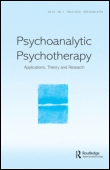
Psychoanalytic Psychotherapy
Advancing Understanding in Psychoanalytic TherapyPsychoanalytic Psychotherapy is a distinguished journal published by Routledge Journals, Taylor & Francis Ltd, focusing on the intersection of psychoanalysis and psychotherapy. Established in the United Kingdom and spanning its influential discourse since 1985, the journal has become an essential resource for researchers, clinicians, and students in the fields of Clinical Psychology and Psychiatry and Mental Health. With an impact factor reflecting its critical role in contemporary mental health discussions, Psychoanalytic Psychotherapy is indexed in Scopus and proudly holds a Q3 ranking in both Clinical Psychology and Psychiatry categories. The journal aims to publish cutting-edge research, theoretical advancements, and clinical applications, fostering a deeper understanding of psychoanalytic principles in therapeutic settings. Although it does not offer Open Access, the journal remains crucial for professionals seeking to explore the latest insights and empirical findings in psychoanalytic therapy.
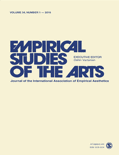
Empirical Studies of the Arts
Bridging Art and Science: A Platform for Empirical ExplorationEmpirical Studies of the Arts is a prominent academic journal published by SAGE Publications Inc, specializing in the interdisciplinary fields of Literature, Music, and Visual Arts and Performing Arts. With an impressive Q1 ranking in multiple categories for 2023, this journal serves as a crucial platform for scholars, researchers, and practitioners engaged in the empirical exploration of arts and their influence on society. Established to foster rigorous inquiry, the journal features peer-reviewed articles that delve into both qualitative and quantitative research methodologies. This commitment to maintaining a high academic standard is evident in its Scopus rankings, which place it in the 99th percentile in Literature, 96th percentile in Visual Arts, and 92nd percentile in Music, making it a vital resource for those seeking to enrich their understanding of arts-related phenomena. While the journal does not currently offer open access options, it remains dedicated to advancing knowledge through comprehensive research, contributing significantly to the ongoing discourse in the arts.
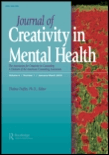
Journal of Creativity in Mental Health
Unlocking New Dimensions in Mental Health and CreativityJournal of Creativity in Mental Health is a transformative platform dedicated to the intersection of creativity and mental health, inviting scholarly contributions that explore innovative approaches to psychological well-being. Published by Routledge Journals, Taylor & Francis Ltd since its inception in 2006, this esteemed journal seeks to illuminate the vital role of creative expression in enhancing mental health outcomes. With an impact factor that reflects its growing influence within the fields of Clinical Psychology and Psychiatry, it holds a Q3 recognition in both categories as of 2023, indicative of its niche but impactful contributions. Researchers, professionals, and students are encouraged to engage with this journal as it fosters a multidisciplinary dialogue on creativity’s potential in therapy and rehabilitation. Although not available as an open access journal, articles can be accessed through institutional subscriptions. Set against the backdrop of a rapidly evolving mental health landscape, the Journal of Creativity in Mental Health is poised to inspire groundbreaking studies and transformative practices in the vital area of mental wellness.
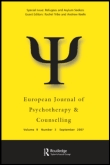
European Journal of Psychotherapy & Counselling
Exploring new frontiers in counseling and therapy.The European Journal of Psychotherapy & Counselling, published by Routledge Journals, Taylor & Francis Ltd, is a leading platform dedicated to advancing the fields of psychotherapy and counseling in Europe and beyond. With an ISSN of 1364-2537 and E-ISSN 1469-5901, this journal aims to foster interdisciplinary dialogue among researchers, practitioners, and educators by presenting innovative research, critical reviews, and practical insights. Despite its current ranking in the Q4 quartile for both Clinical Psychology and Psychiatry and Mental Health, the journal's commitment to improving therapeutic practices and understanding patient experiences underscores its importance in the mental health landscape. Addressing a wide range of topics from evidence-based therapies to emerging therapeutic modalities, the journal aspires to enhance knowledge and promote effective counseling practices. While it does not offer Open Access options, the European Journal of Psychotherapy & Counselling continues to serve as a vital resource for those invested in the enhancement of psychological well-being.

Mediterranean Journal of Clinical Psychology
Advancing Clinical Insights Across the MediterraneanThe Mediterranean Journal of Clinical Psychology, published by UNIV STUDI MESSINA, is a prominent platform dedicated to the dissemination of high-quality research in the field of clinical psychology. Established as an Open Access journal since 2013, it offers valuable insights and resources to researchers, professionals, and students interested in psychological practices and interventions, particularly within the Mediterranean context. With an impact factor that places it in the Q3 tier of Clinical Psychology journals as of 2023, and a Scopus rank of #105 out of 311, the journal plays a pivotal role in advancing knowledge and fostering discussions in clinical psychology. The publication scope encompasses a wide range of topics related to mental health, therapeutic methods, and psychological research, making it an essential resource for those keen on staying at the forefront of developments in the field. Based in Messina, Italy, the journal also seeks to bridge gaps between clinical practices and academic insights across cultural contexts, contributing to the global dialogue on psychological health.